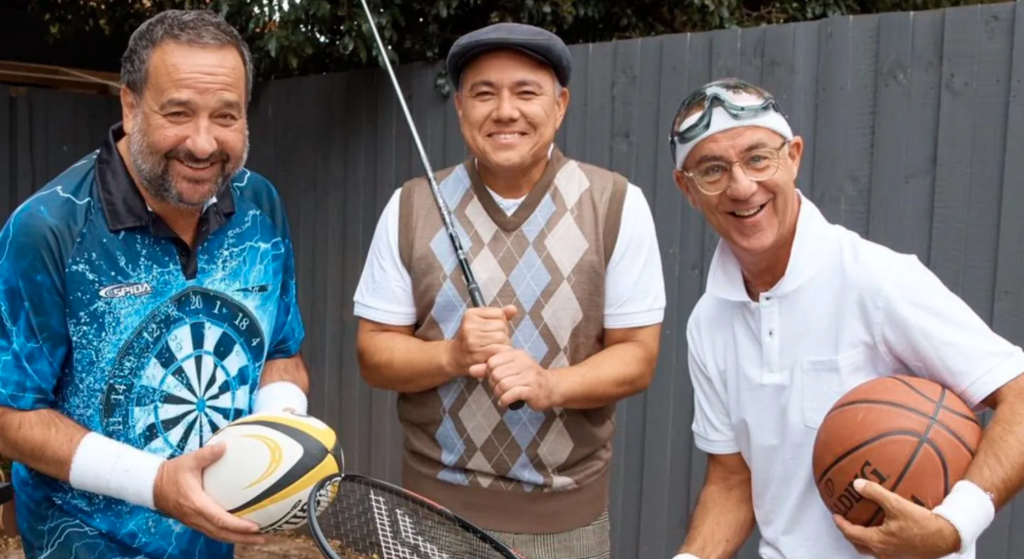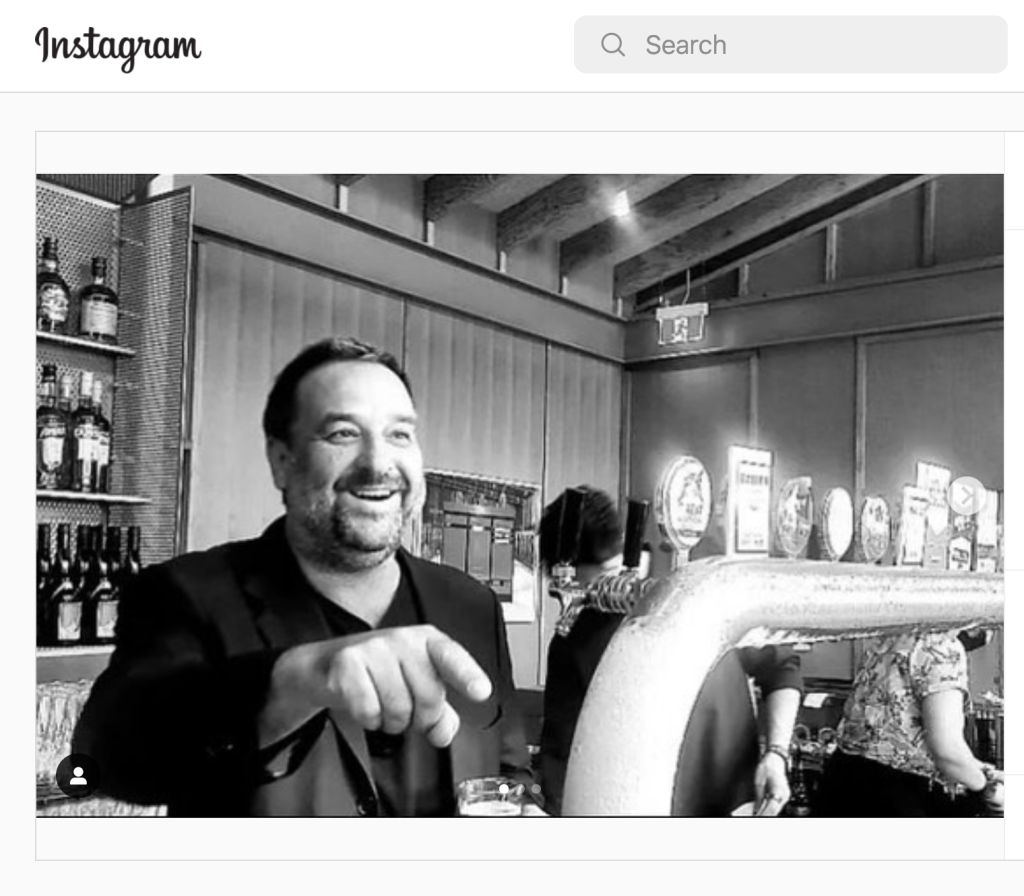Australian Tumbleweeds
No accounting for taste
It’s press release time!
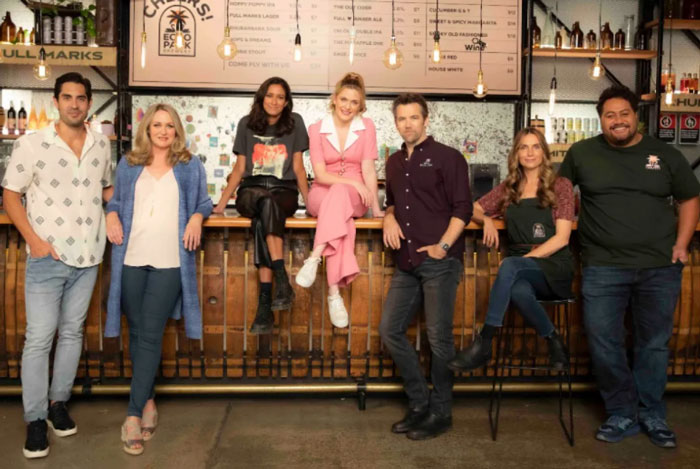
Screen Australia, BINGE and Screen NSW have announced production has begun in Sydney on a new Australian-made original series Colin from Accounts, commissioned for BINGE.
The eight-episode romantic comedy is created and written by, and stars, Patrick Brammall (No Activity, A Moody Christmas) and Harriet Dyer (Wakefield, The Invisible Man).
Centred on Ashley (Dyer) and Gordon (Brammall), two single(ish), complex humans who are brought together by a car accident and an injured dog, Colin from Accounts is about flawed, funny people choosing each other and being brave enough to show their true self, scars and all, as they navigate life together.
The series is produced by Easy Tiger Productions and CBS Studios, with Rob Gibson and Ian Collie producing for Easy Tiger (Jack Irish, Rake, Doctor Doctor, Saving Mr Banks). Directors are Trent O’Donnell (No Activity, The Letdown), Matt Moore (The Great, Diary of an Uber Driver) and Madeleine Dyer. Executive Producers are Patrick Brammall, Harriet Dyer, O’Donnell, Alison Hurbert-Burns and Brian Walsh.
Screen Australia’s CEO Graeme Mason said, “We’re thrilled to support creators Harriet Dyer and Patrick Brammall whose careers have been exploding overseas, as they join forces on this relatable and charming home-grown comedy. Teaming up with the talented producers at Easy Tiger, Colin from Accounts will undoubtedly delight and resonate with viewers on BINGE.”
BINGE Executive Director, Alison Hurbert-Burns said, “We are thrilled to announce that we’re going into production on this Australian original series, following the successful debut of our first original romantic drama, Love Me. Colin from Accounts, is a comedy packed script and a unique romantic story that is grounded by very relatable characters that we hope Australians will love”.
Easy Tiger’s Rob Gibson and Ian Collie said, “Dyer, Brammall, rom-com, cute dog: what’s not to love? It’s a delight to be working on this hilarious and big-hearted show with Harriet, Patrick, Trent, Matt and Maddy, which is a ridiculous amount of talent all in the one place. We’re very grateful to our partners at BINGE and CBS Studios, who immediately saw the appeal of Colin from Accounts for their audiences in Australia and around the world, and also of course to Screen Australia and Screen NSW for their wonderful support.”
Head of Screen NSW Grainne Brunsdon said, “Screen NSW is joining forces with the FOXTEL Group and Screen Australia to secure another original series for NSW’s highly skilled screen industry. Colin from Accounts is a BINGE original series that aligns the production know-how of Easy Tiger with the creative team of Patrick Brammall, Harriet Dyer and Trent O’Donnell for an exciting rom com series set in Sydney.
“I know this 100% NSW-made production will deliver laughs for audiences at home and abroad,” Brunsdon said.
The series is distributed outside Australia and New Zealand by ViacomCBS Global Distribution Group.
The series commissioned for the Foxtel Group will be produced by Easy Tiger Productions and CBS Studios. It has major production funding from Screen Australia with support from Screen NSW.
So… “relatable and charming home-grown comedy”, “rom-com, cute dog”, “big-hearted”, “will deliver laughs for audiences at home and abroad” …yeah, we get the vibe. We’re predicting mildly eccentric characters, low-stakes peril, and minimal belly-laughs.
This isn’t the kind of show that’s designed to be funny. It’s the kind of show that’s designed to be sold to international streaming services looking for inoffensive dramedies in mildly exotic locales.
Trip to the Brain
(slightly late) Press release time!
Lune Media has announced a series commission from Network Ten for a brand-new quiz show – Shaun Micallef’s Brain Eisteddfod.
The one-hour, weekly quiz program is hosted by actor, writer, television presenter and one of Australia’s favourite comedians Shaun Micallef.
Leonie Lowe, Managing Director at Lune Media said: “I’m thrilled to be working with Shaun again on this exciting new series. It is the third time we have collaborated, and our partnership has always been both respectful and successful. I really admire his passion and commitment to his work and the team.
Viewers will see Shaun’s natural ability to engage and encourage the young contestants with his unique mix of quick-fire humour and razor-sharp wit.”
Over ten weeks Shaun Micallef’s Brain Eisteddfod brings together eighteen schools from around Australia and will pit their best and brightest Year 11 students against each other to determine Australia’s biggest brains.
Teams of three will combine for testing of their knowledge on a range of subjects from English, Mathematics, History, Foreign Languages to Biology and Economics, and much more for a fiercely contested and fun-filled one hour of entertainment.
Shaun Micallef said: “I’ve always believed there was intelligent life on this planet, and I am delighted and proud to be part of Channel TEN’s efforts to discover it right here in Australia. Also, I was once a Year 11 student myself and will be using my old notes to double-check the answers.”
Shaun Micallef’s Brain Eisteddfod is a Lune Media production in association with Giant Baby for Network Ten Australia. The series is based on an original concept from Giant Baby and Lune Media. Executive Producers are David Galloway, Shaun Micallef and Leonie Lowe.
It’s the It’s Academic reboot we’ve been waiting for! Finally a new generation will understand that Late Show sketch where Santo says “Tonga”!
Otherwise, everything here makes total sense without once sounding like something we’d be excited to watch. If it wasn’t official before that the only way comedians can get on Australian commercial television is on a quiz show, it sure is now. Bob Franklin for the next host of Family Feud!
In fact, we might even be a bit disappointed at this news: while it’s certainly possible for Micallef to fit this in between two seasons of Mad as Hell in 2022, this does make that seem a bit less likely… though realistically, this year’s return of Question Everything and The One That’s Just Hypotheticals But With Annabel Crabb had already sealed the death of ABC comedy.
But on the up side, at least “Brain Eisteddfod” is moderately amusing to say.
Wake up: Time to Buy
Time to Buy is a half-hour comedy special currently being serialised on SBS’s yoof news program The Feed (you can also watch the whole thing on SBS On Demand). It’s a musical about a young couple who decide it’s time to dive into the housing market. Yes, that’s the joke.

Let’s say some positive things first because honestly? At a basic level this is a perfectly okay way to spend just over half an hour (or five or so seven minute segments). Let’s start with the two leads: they’re charming and likable! We’d happily watch their further adventures in some kind of lightweight drama. Their deadshit roommate Calvin; clearly a deadshit, but not a totally generic one – best comedy character in the show.
In fact, almost all the character stuff was well observed and relatively nuanced. There was even a non-evil real estate agent, which was a brave move for something ostensibly a comedy. There was a firm sense here that they wanted to avoid the obvious cliches, and when they couldn’t – enter the rich boomers* looking to buy the same property as our heroes – we at least got a musical number from their side of things and a semi-decent joke about not understanding WhatsApp.
But was it funny? Let’s look at it this way: no.
Taking a boring, mundane subject and making a musical out of it was funny once and may very well be funny again, but if Time to Buy is any guide it is currently not funny at all. The musical numbers themselves weren’t bad**; the scenes around them were also not bad. But the juxtaposition of the two did not, in any real way, create comedy.
Still, points for trying. No points for the actual story, which [SPOILER] goes like this: sick of their crap house, crap roomate and rising rents, our two young people decide to buy a house. A mortgage broker arranges a loan – easy! They love the first house they see – easy! But some evil boomers also want it – then there’s an auction! The results will shock you, the end.
With only a half hour to work with and a bunch of musical numbers to fit in, the plot clearly couldn’t afford to be too complex. But who thinks the big stress point in house hunting for first home buyers is the auction and not, say, trying to save a deposit? Or finding a house they like? Or finding a house they like that they can afford? Or finding a house they can still afford two weeks later when prices have gone up fifty grand?
There’s a lot of moving parts when it comes to buying a house. This could have mined those issues for comedy instead of rushing to a big dramatic ending that didn’t really pay off. Though from what broad comedy there was on display – notably the jogger who horned his way into the framing sequence and proceeded to be annoying in a way that was clearly intended to be funny but was really just annoying – maybe getting laughs was never going to be this special’s big strength.
Remember last year’s run of millennial comedies that were just low-key dramas with occasional bitchy comments? Pretty much any non-murder story about anyone under thirty is going to be filed under “comedy” no matter what. So a half hour drama about house hunting? Not going to happen.
A mildly exasperated, FML tone might be accurate for millennials’ lives, but it doesn’t automatically make a story into a comedy. But hey, if you don’t have a load of decent jokes about house hunting maybe pick a different subject, just add a bunch of songs and hope the contrast between the form (a musical) and the content (buying a house) generates laughs.
Usually when it comes to Australian comedy it’s all too easy to see the reasons why it’s not funny. Not here: a one-off half hour musical comedy special has no excuse for not being hilarious from start to finish. What’s holding it back? Not the subject matter, not the talent involved, not some requirement to be a “dramedy” for overseas sales. This should have been a full half hour of solid laughs.
Instead we got a well-meaning real estate agent and a jogger we wanted to slap.
*okay, we did laugh at the Leunig reference
**just in musical terms,”weren’t bad” is underselling the songs. If we were a musical review blog instead of a comedy review blog we would have rated this a lot higher
Damn stinking lies
If everything else on commercial television wasn’t already a local remake of some successful show from America or Britain or South Korea, you might wonder why Network 10 was bothering to make a local version of the British comedy panel show Would I Lie To You? Australian commercial television has rarely succeeded at comedy panel shows. This blog is littered with reviews of shows like Can of Worms, which was hosted for two series by Would I Lie To You? Australia’s host Chrissie Swan, or The Unbelievable Truth, which featured one of Would I Lie To You? Australia’s team captains Chris Taylor.
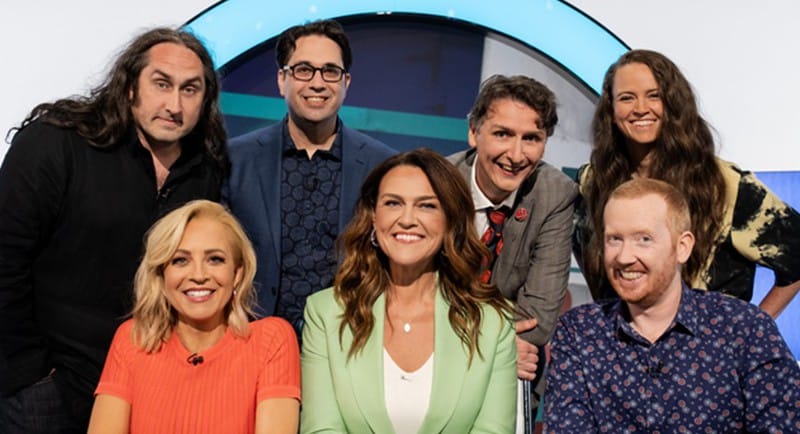
The real reason Would I Lie To You? Australia exists is probably because Have You Been Paying Attention? isn’t back yet. And 10 wants to make Monday nights on 10 the year-round home of comedy. If true, it’s a worthy aim, but Would I Like To You? Australia will have to sharpen up a bit to be worthy of keeping Have You Been Paying Attention?’s seat warm.
The British original of Would I Lie To You? is fast-paced and, crucially, lasts only half an hour. Would I Like To You? Australia has its moments, comedically, but goes on for far too long. We get it, a commercial TV half-hour isn’t enough time to do this show justice. Yet a commercial TV hour really out-stays its welcome when it comes to this format.
In case you don’t know the concept, host Chrissie Swan asks team captains Chris Taylor and Frank Woodley, and guests Ross Noble and Carrie Bickmore (on Chris’ team) and Zoe Coombs-Marr and Luke McGregor (on Frank’s team), to tell us a series of tall tales. The opposing team then has to say if the story is true or a lie. If the opposition is right, they win. If they’re wrong, the storyteller team wins.
Or something like that because who actually cares? We tuned in for laughs, and what with the need to stretch out the show to fill the timeslot, we got less than we should have. Having said that, Ross Noble’s story about making sandcastles with Rod Stewart had its moments, as did Luke McGregor’s unbelievable claim that he’s highly skilled at taekwondo. McGregor was probably the best on the night, also claiming that he’d once serenaded a woman called Vanessa with an original composition – part of which he played. Points also go to Frank Woodley for his story about guest-hosting Hey! Hey! It’s Saturday, which led to some fun gags about Daryl Somers.
The problem with Would I Lie To You? Australia, though, is the pacing: there are too few gags and it goes on way too long. Even the faster pace promised by the ‘Quick Fire’ round was a disappointment, with things seeming to drag on for as long as they did for all the other rounds. Sort out the pacing and up the gag rate and this could be decent, but that may also mean reducing the timeslot, and will 10 really want to go there?
If We Knew You Were Coming (back), We’d Have Baked a Cake
Press release time!
ABC is pleased to announce that filming is underway in Adelaide on the second season of ABC’s food-filled comedy Aftertaste. Embraced by audiences and critics alike, the series features the much-loved Erik Thomson as celebrity chef Easton West, and rising star Natalie Abbott as his niece and pastry chef extraordinaire Diana.
They’ll once again be joined by an exceptional ensemble cast including Rachel Griffiths (Total Control, Finding The Archibald), Wayne Blair (The Sapphires, Irreverent), Susan Prior (Glitch, Frayed), Remy Hii (Harrow, Spider-Man: Far From Home), Kavitha Anandasivam (The Tourist, The Hunting) and Justin Amankwah (Fat Pizza vs Housos), while Lynette Curran (Cleverman, A Few Less Men), Julian Maroun (The Secrets She Keeps) and Syd Brisbane (Stateless) join the cast for season two.
Erik Thomson said: “I’m so thrilled to be heading back to the beautiful Adelaide Hills for another season of Aftertaste. It’s a privilege to work with Closer Productions and the ABC, as we deconstruct our relationship with food and fame, through the antics of the dysfunctional West family.”
Season two picks up with Easton West (Erik Thomson) living his life out of the public eye and concentrating on being a better man, until his new-found peace is shattered by the return of his niece Diana (Natalie Abbott) to Adelaide, flaunting her successful career and love life in London. But both must put their troubles aside when a secret from the past throws the West family into more chaos than ever.
Written by Julie De Fina, Matthew Bate and Matt Vesely, produced by Closer Productions (The Hunting, F*! #cking Adelaide, Animals) and directed by Reneé Webster (How To Please A Woman), Aftertaste will film across Adelaide and the Adelaide Hills region and will premiere later this year on ABC TV and ABC iview.
“Embraced by audiences and critics alike”, you say? Interesting.
Which is more than we can say about the plot, as it sounds very much like the traditional “let’s do the same thing all over again only now the lead roles are reversed” storyline that time and time again has failed to be embraced by audiences and critics alike.
Bet the Adelaide Hills will look like a great place for a holiday though.
A Hundred Miles and Running
When Nine tapped Hamish & Andy on the shoulder and hired them to bring their knockabout larrikin hijinx to the nation’s premier commercial network, it seemed like a vote of confidence in the future of Australian comedy. A decade later and the duo are now each hosting their own generic gameshow. What went wrong?
“They got old” is the most obvious answer. Sure, Hamish & Andy’s mix of light-hearted pranks and quirky curiosity possibly could have sustained a media career. Just not at Nine, where the “younger audience” are interested in talent shows and home renovations, not oddball overseas adventures. Their last joint project for Nine, True Story with Hamish & Andy, was more often than not a light-hearted delight; it’s also most likely the last half hour scripted comedy we’ll see on Nine for the foreseeable future.
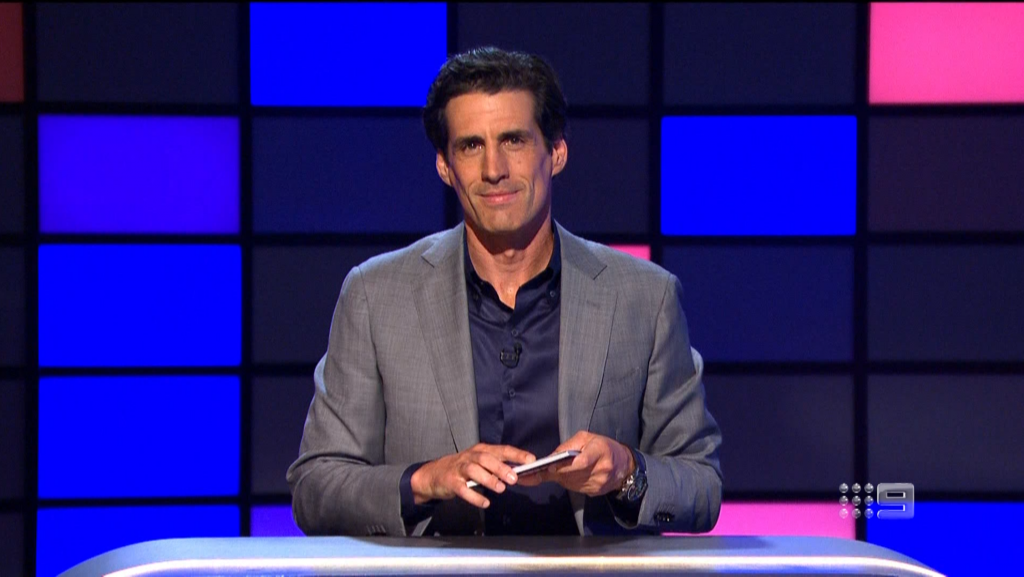
Now Hamish Blake gets to host toyetic smash hit Lego Masters. And Andy Lee? He gets what feels like the consolation prize in The Hundred with Andy Lee, a show that combines the boring parts of Family Feud with a Zoom call for a full hour of what the kids call “content”.
There’s honestly not a lot more to it than that. The old Family Feud used to survey a hundred faceless people to get their quirky and unusual responses; The Hundred has them up on a video wall where occasionally one gets asked to explain their answer – or just tell a story – in more detail. It’s like a Vox Pop, only nobody has to leave the house.
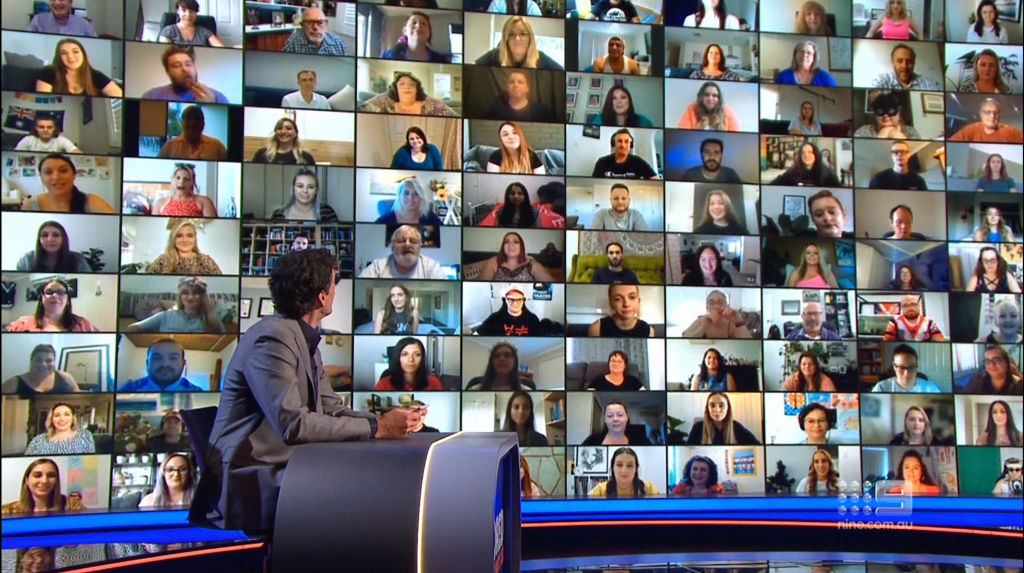
As for the competition angle – because of course there’s a competition angle, we’re talking about the network that turned making stuff out of Lego into a competition – there are three celebrity guests who are either comedians or can be loosely defined as “comedians”. Thus explaining why we’re talking about The Hundred.
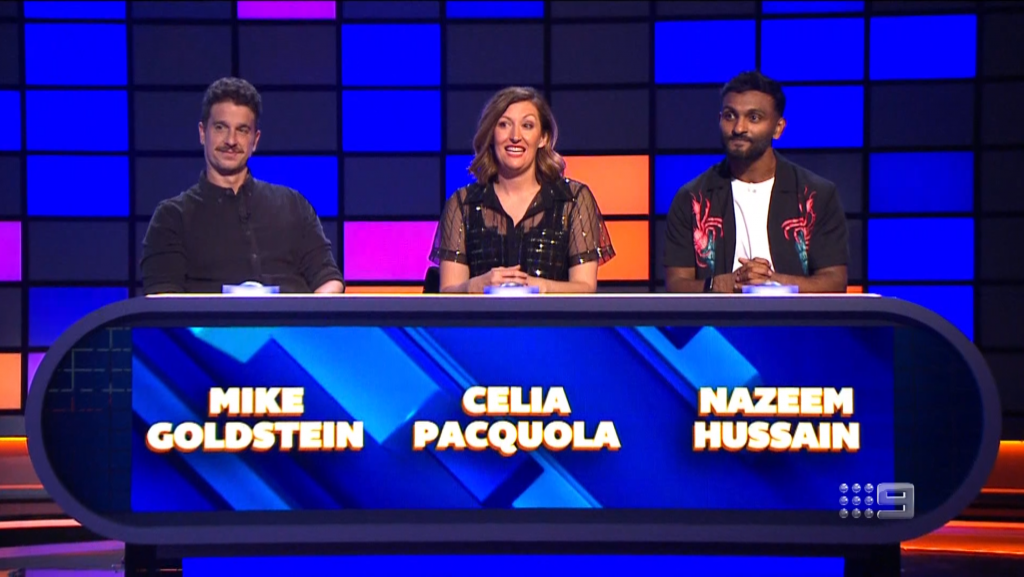
They try to guess the Hundred’s response to mildly edgy questions – “what percentage of The Hundred are hiding their sexuality” was one, though “what is Australia’s favourite emoji” was the one they used on the promos – and… Look, it’s a comedy game show, there are scores and stuff but nobody cares.
Unfortunately nobody really cares about being all that funny either. That became clear long before the arrival of special guest star Dermot Brereton (who?). Everyone is really just there for a casual chat and the occasional shocked expression / witty one-liner. Weirdly, the show as a whole is positioned as something of a cultural experiment – a way to find out what Australians really think, only as a game show.
(though it seems likely that the answer to the question “Are the Hundred really representative of Australia as a whole?” is “it’s just a bit of fun, okay”)
Unfortunately the surprises weren’t really all that surprising to anyone with access to the internet. People make sex tapes? Who knew? Probably not the average 60-something Channel Nine viewer, which explains why comedy and commercial television will be an increasingly difficult fit until someone comes up with a reboot of Mother & Son that’s on the side of the mother.
Though to be fair, the show did leave us with one question:
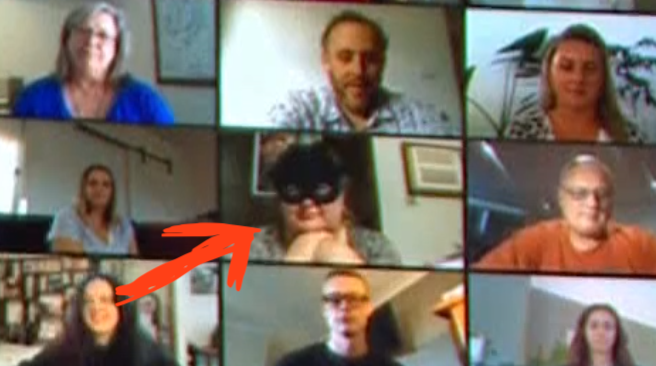
What was going on with the woman wearing the cat burglar mask?
Thursday night’s alright for satire
Thursday night satire is back! Oh, alright, it was back four weeks ago when Mark Humphries did that RAT sketch, but now Sammy J’s back so SATIRE BOOM!
Not that Sammy J’s sketch looked promising, what with Scott Morrison and Hawaii seeming to be the premise. As tone-deaf and awful as Scott Morrison’s 2019 Hawaiian getaway was, gags about it are starting to seem hack in 2022. As bad as ones about Engadine McDonalds. Seriously, Scott Morrison’s done nothing else in the past couple of years for you to make gags about. Are you sure?
Anyway, Sammy J’s 2022 debut turned out to have a bit more bite than your average ScoMo/Hawaii gag. In the sketch, we meet Scott and Jenny Morrison’s forgotten son, ScoMoMo, who has been tracked down by an interviewer…
INTERVIEWER: Well, as the son of Australia’s Prime Minister, the country needs to know whether you think your dad should be re-elected.
SCOMOMO: No, they don’t. Like, I’m just his son. Why should that matter? You know? Vote for my dad based on his policies. OK, don’t do that. Vote for my dad based on what he stands for. Yeah, OK, I don’t know what he stands for. Just… Can you ask me a question about his curry or something so we can get this over with?
INTERVIEWER: What’s his curry like?
SCOMOMO: It’s OK. Like, it’s tasty. But I wouldn’t use it to choose a government.
INTERVIEWER: You haven’t seen the 60 Minutes interview, have you, ScoMoMo?
SCOMOMO: Wasn’t invited, didn’t watch it.
INTERVIEWER: So, you don’t know what your mum was talking about when she says she felt sick to her stomach?
SCOMOMO: No. Was it about trans kids being discriminated against at school?
INTERVIEWER: No.
SCOMOMO: The Bilolea girls who grew up in detention?
INTERVIEWER: No.
SCOMOMO: Allegations of sexual assault in Dad’s workplace?
INTERVIEWER: No.
SCOMOMO: Aged care crisis?
INTERVIEWER: No.
SCOMOMO: Not that? Oh, is it Dad’s close friendly with Brian Houston? Uncle Brian.
INTERVIEWER: No.
SCOMOMO: Gee, what made Mum sick to her stomach? Was it one of Dad’s curries?
Like we said, there are plenty of things other than a Hawaiian holiday that you bag Scott Morrison for in 2022. And while you’re at it, a swipe at the tabloid media’s a good idea too.
But for those of you watching Mark Humphries on 7.30, there was less bite on offer. In his sketch, also referencing Scott Morrison’s recent 60 Minutes appearance, Humphries plays music producer Robert Woodstig*, coaching Morrison on his ukulele playing.
The sketch isn’t dreadful but it’s more fan fiction than satire, simply working famous footage of politicians singing pop songs badly into a mockumentary about music production. There’s no bite or commentary here, just some half-hearted gags. See also that RAT test sketch where Humphries, in search of a RAT, finds himself in an action movie trailer.
Isn’t the real problem with RAT tests that the government has massively screwed up ordering enough for everyone? So, why is this a tale of a hero battling the odds rather than a sketch sticking the boot into incompetent bureaucrats?
Hitting the target, or at least getting near it, should be a base level requirement for a satirical sketch, so it’s amazing how often Humphries fails to do it. At least in his sketch from two weeks ago, in which he gives Scott Morrison a performance review, we get some commentary on Scott Morrison’s failings.
With the number of failings Scott Morrison has, it really shouldn’t be so hard.
* One for the Boomers and music nerds.
Mad as Hell in Shock Edit Controversy
Well this was interesting:
Sadly for us, because like everyone else in the Australian media we are little more than ravenous black holes of hate that require everyone else to suffer in order to even slightly relieve our pain, this wasn’t some massive scandal involving government interference or the ABC caving to outside interests. Instead, the finance segment hosted by Tosh Greenslade (in glasses and a wig) had used the analogy of a shark attack to describe the Australian economy.
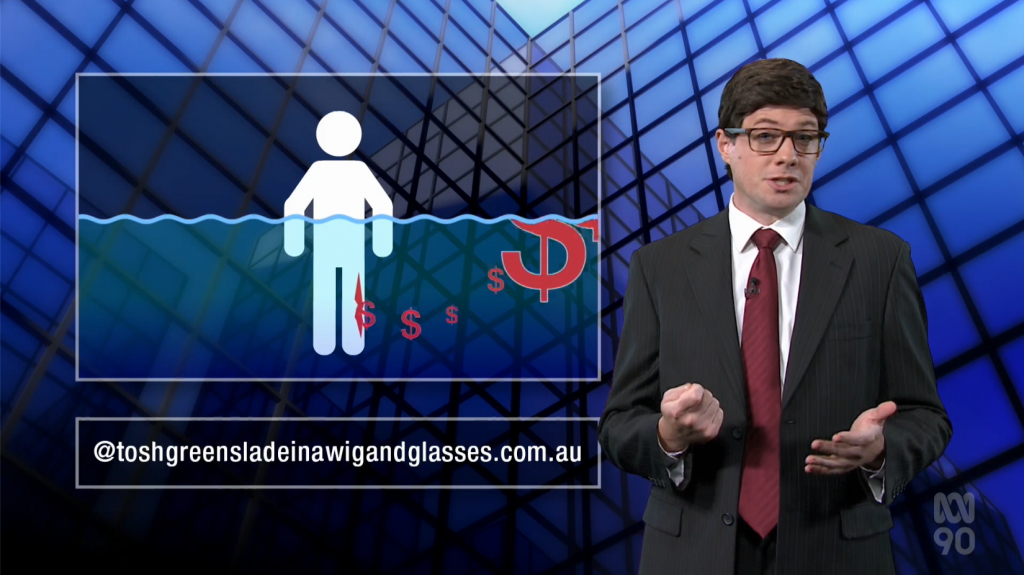
Unfortunately, around three hours before the episode (recorded the day before) went to air, this happened:

Which made the segment a fair bit less funny for a lot of people.
So into the bin it went, and fair enough. But what to replace it with for the numerous repeats plus its eternal life on iView? Turns out the crack editing team at the ABC slaved away for a couple of hours to replace it with an earlier Tosh Greenslade finance segment from the first episode of the year. Seamless!
Especially as they actually used some footage from the original:
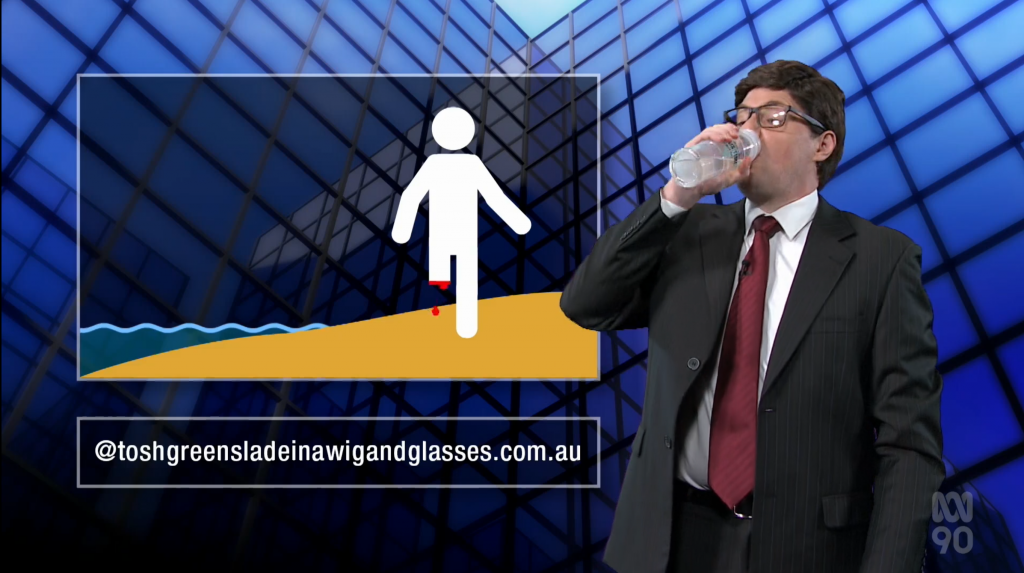
… but with the background from the new (that is to say, old) segment green-screened in so Shaun Micallef’s outro still made sense:
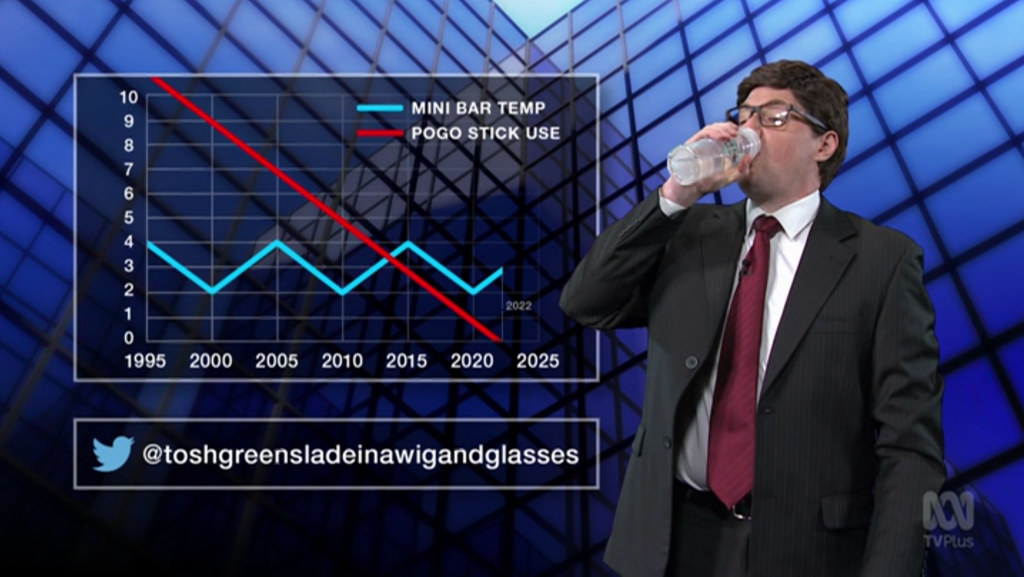
The bad news is, they’re going to have to re-do this segment all over again once they find out the current Jackass movie has a pogo stick stunt in it.
What We Talk About When We Talk About Not Having Anything to Talk About
Hey, where’d all the scripted comedy go?
When we started this blog the basic idea was to do two or three posts a week, because each week there was usually two or three shows on television we could talk about. There’d be something new, something in the middle of its run, maybe a press release or two, the occasional DVD release of some archive material. Life was good.
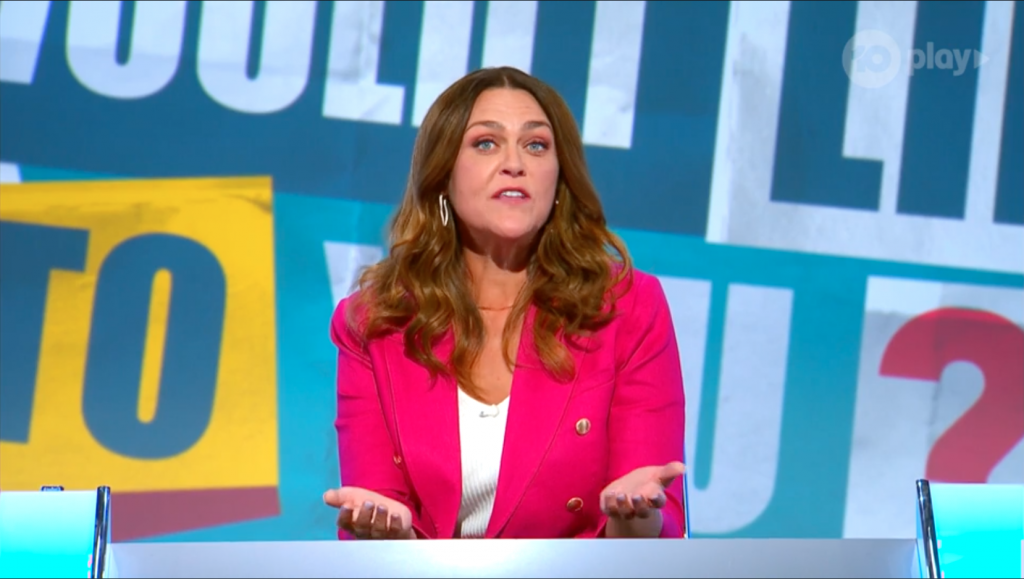
Now we’re looking at what lies ahead for 2022 and… yeah. There’s maybe a handful of new scripted series; a lot of the year’s comedy content is coming from series that have been around for close to a decade now. Ok, there’s online content out there, but much of that barely needs more coverage than “hey, so this exists”. We are in the middle of a drought, and the only way it could be worse is if we were a blog covering Australian TV drama.
(hands up who’s excited about Troppo? Hands up who became a lot less excited about Troppo once they realised having a comedy title didn’t actually make it a comedy?)
To be fair, the many and various streaming services are occasionally serving up scripted content, which almost sorta kind of balances out the massive drop off in ABC comedy. Remember when the ABC’s Wednesday night comedy line-up was almost always three local comedy shows – at 8pm, 8.30pm and 9pm, with 9.30pm not out of the question – and the 8pm show wasn’t a shithouse no budget revamp of The Einstein Factor?
And yes, the ABC is still coming up with exciting new formats like, uh, Question Everything and Win the Week, so comedy isn’t completely dead so long as you’ve already spent the last decade being unfunny at a professional level for the ABC. Can a Randling reboot be far off?
Commercial television can’t look smug either as we stare down a year where the only fresh comedy content from them is Ten’s upcoming version of Would I Lie To You?– hosted by Chrissie Swan with team captains Chris Taylor and Frank Woodley, if you weren’t excited enough already. So Peter Helliar was too busy?
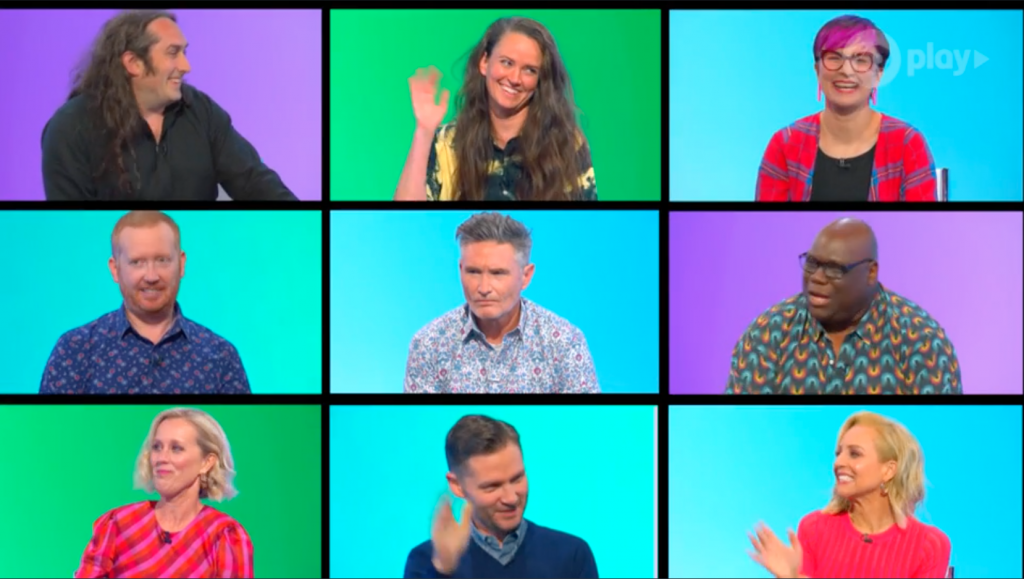
Any way you dice it, times are tough out there if you’re trying to get laughs. The days of getting exposure and practice on high profile sketch shows is over (did Ten ever officially announce Kinne wasn’t coming back?). If you’re lucky you might get to provide “satirical” content for a youth news show where laughs are fine just so long as you make sure they’re the right kind of laughs – you know, the ones that aren’t funny unless you follow #auspol on twitter.
So why are things so shit? Don’t people want to laugh any more? We’re no experts, but it’s not like there’s a shortage of reasons why comedy in Australia is struggling – everything from “reality TV has taken over from comedy as far as cheap content goes” to “there’s no path for new talent on television in this country now that sketch shows are dead” to “content is an international business and comedy doesn’t sell overseas” to “the ABC refuses to clear out dead wood and gives their panel hosting gigs to the same people over and over again” to “today everything has to be a dramedy where comedy comes last”.
And that’s just off the tops of our heads. Increased funding to the ABC won’t kick-start the old formula – where up and coming comedians get their TV start on the ABC, then move to a commercial network – because even the ABC’s big comedy guns haven’t moved on in twenty years or more. And at best, international streaming services are going to want the kind of rom-coms and dramedies where polish and charm far outweigh genuine laughs.
There’s still a lot of decent comedy to look forward to in 2022. The real problem is, it’s pretty much the same comedy we were looking forward to in 2021, and 2020, and… you get the idea. Coming up, we’ve got a handful of winners, a bunch of shows nobody’s excited about, and not enough in between.
Guess we’d better get to work researching our review of Troppo.

